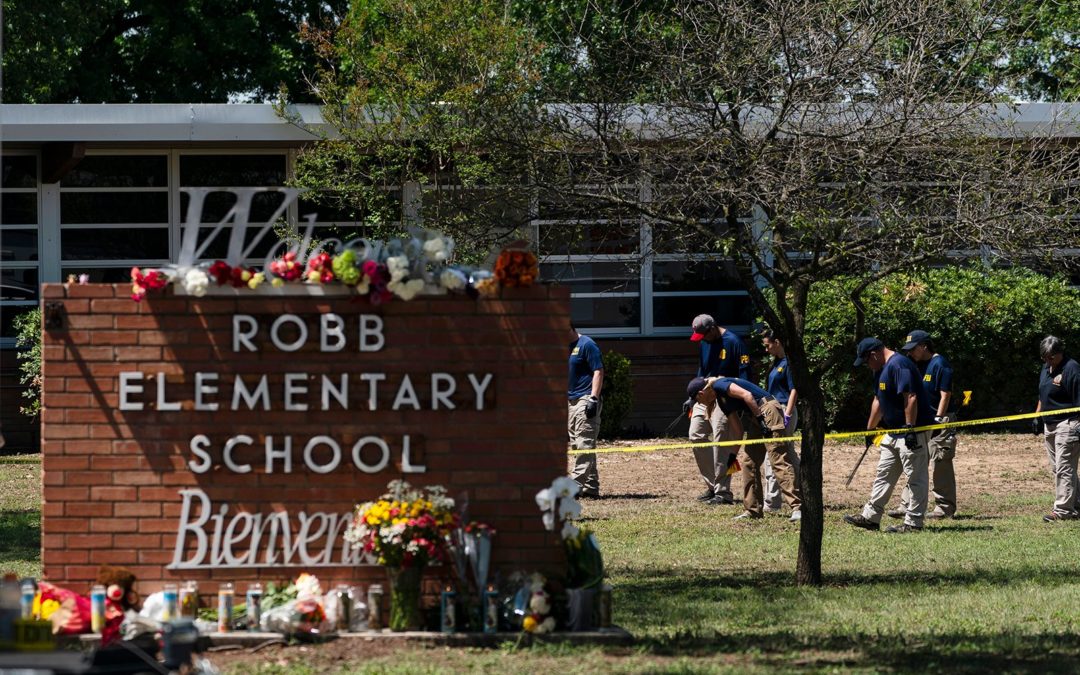
by Alejandra Molina, RNS | May 26, 2022 | Headline News, Social Justice |
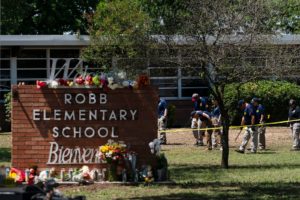
(RNS) — San Antonio Archbishop Gustavo García-Siller was driving back to Uvalde, Texas, on Wednesday morning (May 25) — after having spent most of the previous night there accompanying families in the wake of one of the deadliest school shootings — when he passed by an advertisement promoting guns in the Lone Star State.
“We want children and young people to think differently and the common element to all these situations having happened lately in Buffalo, New York, El Paso and Houston, Texas … the common element is guns, lack of control,” García-Siller told Religion News Service as he was en route to Uvalde.
He condemned gun culture, saying guns are treated as idols and a source of pride among people who may feel like “I am powerful with a gun.”
“We don’t want to give up what that means money-wise, business-wise,” he added.
García-Siller said people can’t be “pro-life” and continue to support laws that allow these kind of shootings to happen. He said a “corrupted political system for years has undermined human beings.”
“If our ethics are not consistent with respecting human life, period, no matter color, language, religion, profession, way of life — life is life — then we are not pro-life,” he said.
Nineteen children and two teachers were killed Tuesday after an 18-year-old gunman stormed into Robb Elementary School in Uvalde, a small, predominantly Latino city of about 16,000 residents. The city sits about 80 miles west of San Antonio. About 1 in 5 residents live in poverty.
“What happened yesterday is one more expression of how we leaders have failed,” García-Siller said.
“I have been many years in the United States and I have been working a lot with immigrants and in very impoverished communities, and it’s just, what else? What else can help us realize that we are people, period,” he added.
After the shooting, García-Siller visited Uvalde Memorial Hospital, where many of the shooting victims were taken Tuesday, and he led Mass at Sacred Heart Catholic Church in Uvalde that evening. He planned to spend the day in Uvalde again on Wednesday.
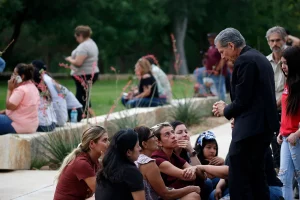 García-Siller has met with the husband of one of the teachers killed in the shooting. The archbishop also spoke with a person who called 911 to report the shooting and referenced a woman who drove children to the hospital from the school. “We don’t need heroes. We need just people of goodwill,” he said.
García-Siller has met with the husband of one of the teachers killed in the shooting. The archbishop also spoke with a person who called 911 to report the shooting and referenced a woman who drove children to the hospital from the school. “We don’t need heroes. We need just people of goodwill,” he said.
While there was a lot of uncertainty on Tuesday as parents awaited news of their children, now there’s a “piercing pain” knowing the outcome, García-Siller said.
Throughout Texas, a number of houses of worship are holding services and prayer vigils to help the community cope with the aftermath.
St. Ann Catholic Church in La Vernia, Texas, is hosting a Mass Wednesday evening in honor of the victims and families of the shooting.
First Baptist Church of Brackettville is hosting a candlelight prayer vigil Wednesday evening. The Rev. Y.J. Jimenez, the pastor there, accompanied parishioners at the hospital who lost their grandchild in the shooting.
Getty Street Church of Christ in Uvalde is also holding a prayer vigil Wednesday for the surrounding community.
And in Houston, religious leaders are planning an interfaith gathering outside the National Rifle Association’s annual convention this Friday.
Megan Hansen, an elder in the Presbyterian Church, and the Rev. Teresa Kim Pecinovsky, a Disciples of Christ pastor and chaplain in Houston, learned about the convention in the aftermath of the Uvalde massacre and felt called to act.
Pecinovsky said those who support the NRA and the gun lobbying industry “are very much rooted in their own religious perspective.”
“It’s important for us as clergy and people of faith to say that is not the only perspective of people with a faith view,” she said.
Living in Texas, Hansen said, “we’re surrounded by so much of this ‘God and guns’ thought.”
“I’m not even going to call it theology, because I don’t understand how you could think about the divine, and not just in Christianity, but many ways that people considered the creation of the world and the Creator and be able to reconcile that with owning a weapon,” Hansen said.
Added Hansen: “This is very much a Christian problem. Which is one reason we want to be witnesses in this, walking with our other faith communities, because it is our problem. It’s coming from inside our house. ”
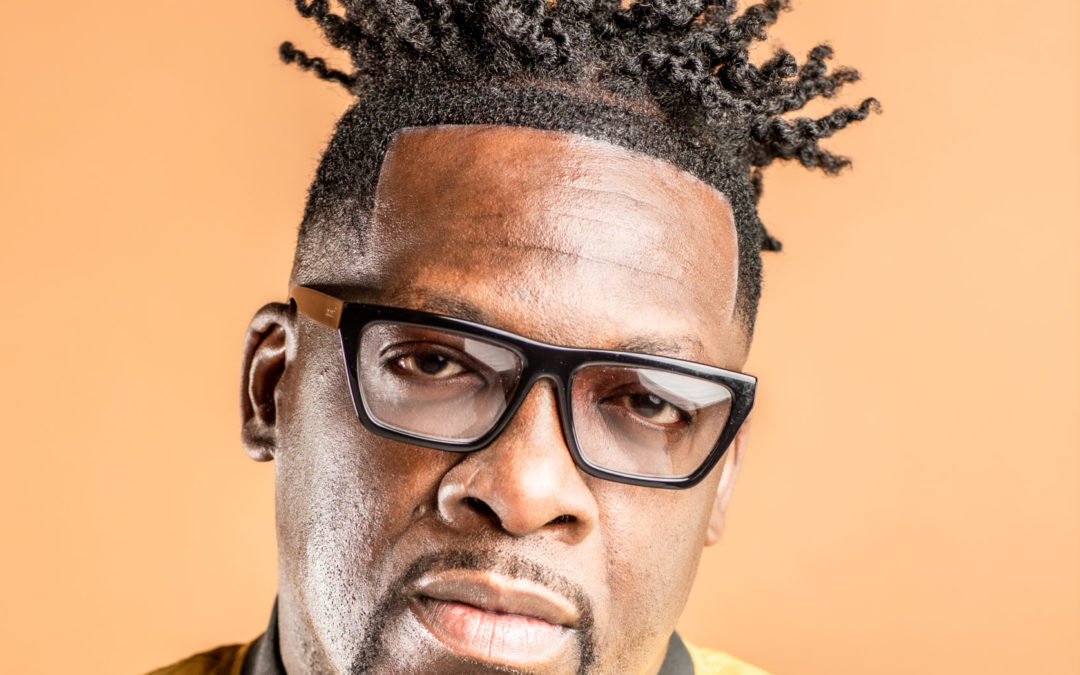
by Allen Reynolds, UrbanFaith Editor | May 25, 2022 | Commentary, Entertainment, Headline News |
UrbanFaith had the opportunity to sit down with artist Otis Kemp to talk about how he is able honor God while sharing His musical gifts. His hit single “The Reason” has gone viral and his music is being played all across the Southern United States. But his impact on his community and his journey to success have been anything but overnight. Otis Kemp shared a few key nuggets of authentic wisdom for people trying to be a blessing while being blessed.
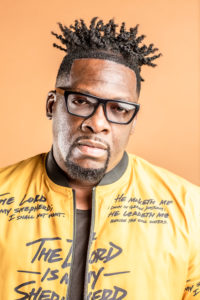 Our Gifts Should Honor God
Our Gifts Should Honor God
You want to share your gift. You want to share the message that God has given you. The music that I represent is life music. I don’t look at a particular genre, like gospel or anything, because anybody can say they are gospel and live like whatever. I believe life music is a testimony of who you are. When you when you see me, you should see some residue or some characteristics of the one Savior.
What Inspires You to Share Your Gift
I mean, to be honest [The Reason] was a song God gave me a couple of years ago, and it was at a dark time in my life. I began to prophesy over my life. I began to declare things that I was taught [since I was] a little boy. The God that my father taught me about [is why I live the way I do] even though at the time I didn’t understand what he was instilling in me. I’m a preacher’s kid and my family prayed.
You know, the Bible says you train up a child in the way they should go, and when they get older, they won’t depart from it. That is a true scripture. I’m evidence of that. I wanted to share with people when I say the God of Abraham, Isaac, Jacob, and Jabez [in my song] I’m talking the one and only true God. I’m talking about the God that you can actually talk to that you can have a relationship with. This ain’t no fake. It’s a real thing that he saved me. Like, I come from the streets. I’m from Miami, Florida, it’s rough. And down here, only the strong survive. God snatched me out of the darkness, snatched me out of the enemy’s camp, and brought me to his side.
How Can You Use Your Gift to Bless Others?
I would say the first thing that they should do is build a relationship with the Most High. I know it sounds cliche, but it’s not. I’m a living testimony. I got kicked out of every school in Miami and South Florida. And now I own three private schools within two and a half years. [It doesn’t] take 30 years; God judges you and he positions you by your heart. If your heart posture is correct, whatever passion you have, he will lead and guide you into all truth. The word of God is true.
If you want success, the only success you will have is with the Lord and in His Kingdom. Anything else is going to tear you down, going to destroy you, going to suck you dry. You become successful when it’s benefiting other people. Everything you do [with your gifts] should benefit someone else. That’s how you know it is from the Most High God. Jesus never did anything for Himself. Everything He did was for someone else. Now [He has] the highest name in the heavens, on earth, and under the earth. When you begin to lay down your life for the kingdom, your desires, your passion, or whatever it is, you can find out what God has already planned out for you. When you follow with Him you will have success. It’s just going to come with obedience.
by Ramon Mayo | May 24, 2022 | Headline News |
The internet is saturated with tons of information for all facets of life, including spiritual resources.
In fact, if you do an Amazon search for something like study Bible results will include a wide variety of options. While scrolling down the list, you will find study Bibles for men and women. You will find study Bibles for couples and you can also find a study Bible in just about every translation. So why would anyone need another study Bible, particularly the Africa Study Bible?
Well, to start, we suppose you should start by asking, “What exactly is the Africa Study Bible?”
While all of aforementioned study Bibles have their merit, the Africa Study Bible delivers something unique. It contains insight and knowledge about the Bible from a non-majority culture perspective. It is packed with over 2,400 features, and 350 scholars from more than 50 African countries have contributed to the making of this Bible.
The features of the Africa Study Bible speak on different topics through the lens of African culture. Whether you’re African or a member of the African Diaspora, this Bible provides in-depth knowledge to show that Christianity extends beyond just one group of people.
Contrary to popular opinion, Christianity is not solely the territory of those of European ancestry. In fact, it is the countries and cultures of the South and the East where Christianity is growing at a rapid rate. Not only that, but studies show that Africa played a major role in the development of Christian theology. The Africa Study Bible helps to make that clear and it can make that clear for you as well.
The Africa Study Bible is loaded with tons of features, including:
- Book introductions explaining the history of each book
- Touch Points to show where the culture of the Bible meets African cultures and how Africans shaped Christian belief
- Learn Notes to teach the foundations, values, and the doctrine of the Christian faith.
- Proverbs and Stories to enlighten readers through the parallels of Scripture and cultural wisdom found in wise sayings and fables.
- Application Notes to inspire readers to reflect on issues and apply truth to everyday life
- Articles giving practical advice on how to live out the Christian faith, focusing on 50 critical concerns facing the church in Africa and its people
- Topical Index and Concordance that lists the biblical text s and Africa Study Bible features by topic and defines difficult-to-understand words connecting concepts from Genesis to Revelation for research and teaching
- Maps, Graphical Timelines, and Other Features that spread throughout the Bible and help provide insight and understanding
With this Bible you will have specific insight and knowledge into the cultures and customs of the Bible from an African perspective. This will equip you with tools to share non-majority insights with your congregation or Bible study. The Africa Study Bible can help you to reclaim Christianity’s African roots.
Check out our interview with Dr. A. Okechukwu Ogbonnaya, Ph.D. on the inspiration behind the Africa Study Bible and its impact on our community below:
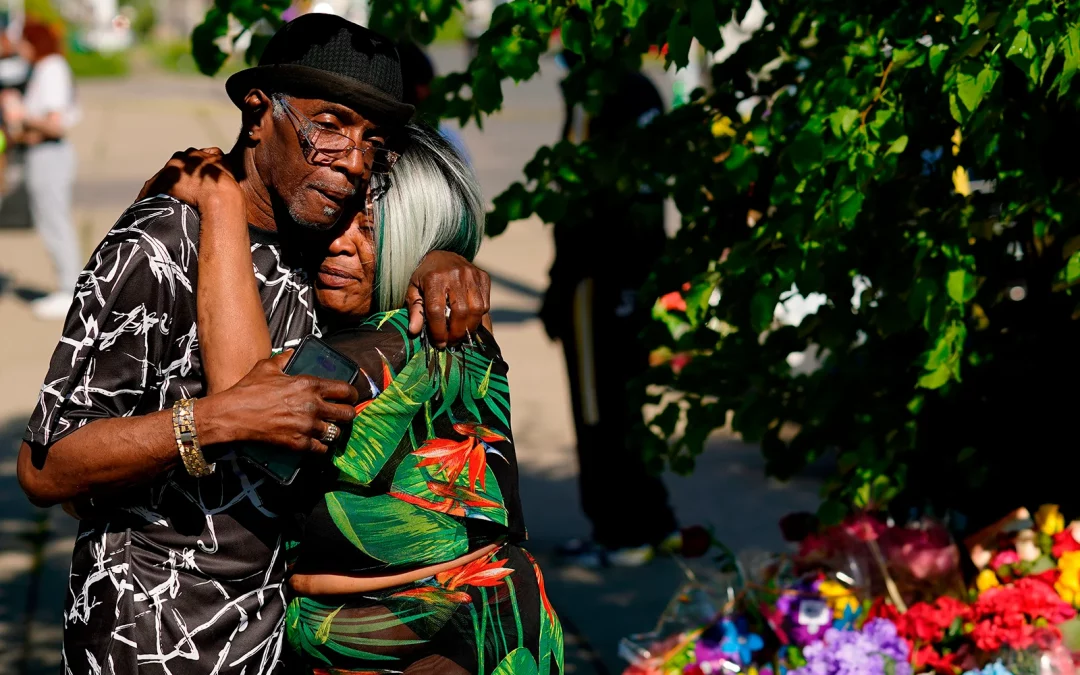
by Adelle M. Banks, RNS | May 18, 2022 | Headline News, Social Justice |
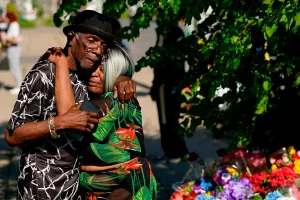
(RNS) — Soon after a white 18-year-old shooter targeted Black customers of a community grocery store in Buffalo, New York, on Saturday (May 14), the Rev. Denise Walden, executive director of Voice Buffalo, a social justice and equity organization, was coordinating clergy to offer grief counseling and help families immediately and, she hopes, for the foreseeable future.
She was also grieving personally: She knows the families of most of the 10 people killed in the massacre.
“This is going to take more than a week, more than a month, more than six months,” said Walden, a member of the clergy team at First Calvary Missionary Baptist Church, a predominantly Black congregation in Buffalo. “We need long-term solutions and support.”
Walden’s 25-year-old organization is a local chapter of Live Free, a Christian organization that has in recent years focused on preventing community violence, which now has new questions to answer, Walden said, about “the hate that caused this person to come into this community and create such a horrible, violent violation to our community.”
She said more resources are needed to counter hate in general and to cope with the reaction from Buffalo’s Black community. “When tragedy strikes and those things are not in place,” Walden said, “we create an environment that can become even more dangerous because people don’t know what to do to process their grief and their trauma.”
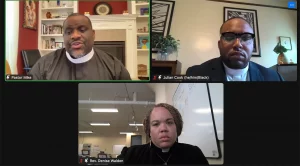
Walden, 42, spoke with Religion News Service about her connections to the people who died on Buffalo’s East Side, who the community has lost and what it needs now.
The interview has been edited for length and clarity.
The massacre on Saturday occurred at a grocery store in your neighborhood. How did you react to the violence that happened there?
I’m a seven-minute walk away from the grocery store. It’s our community store. We’re there regularly. As far as how I reacted, I think I’m still trying to figure that out. For me it was, how do I show up with and in my community, just being a resource and, hopefully, a person to bring some peace and love that are all much needed in this time. And just being as comforting to those who are closest to the pain from this as possible.
You were one of the officiants of a vigil on Sunday outside the Tops grocery store. What words did you find to say?
It was hard. I think we know that there’s a need for comfort. There’s a need for love in our community. And that was the word, reminding people that we are still a strong community; reminding those of us that live here that in spite of this heinous act that we’ve seen, this is still home. This is our home.
You helped notify family members of those who were killed. Was that an unexpected responsibility or have you done that in the past?
That is definitely an unexpected responsibility. I’ve done little bits of it in my clergy capacity. For our organization it’s completely different and completely new. And I’ve never had to show up that way in something so tragic, and also something that is so closely impacting me as well.
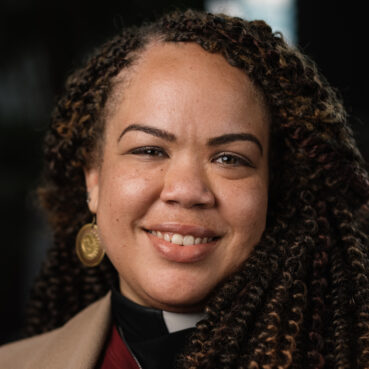
The Rev. Denise Walden. Photo via Voice Buffalo
It must have been very difficult.
Difficult doesn’t even describe it. I don’t think that there are words that can describe what was felt by these families and especially when our community is already in such a deep period of grief just still coming out of the pandemic. And then to now have loved ones ripped away from (them) so violently. That’s very difficult news to deliver to anybody.
Some of those lost have been described as church mothers or community mothers and a deacon — people who may have helped others cope when something like this happens in their community.
They are some of the matriarchs and the pillars of our community. They will be missed in ways that I don’t think I can do justice to describing, but who bring joy to this community. They’re the ones who help stand and hold this community together. Check those of us that need to be checked when we need to be checked. They are such an instrumental part of our community. I know some of them have snatched up my kid, like, “Hey, young man, get it together.” That is a huge loss to our entire community.
How will faith leaders address the mental health needs that there are now?
One of the asks that Voice and our partners have been consistently making is for culturally responsive services — people who understand there is some generational trauma here. People that they can feel a sense of community and trust with. There are very big cultural dynamics at play here. We’re working really hard to coordinate faith effortsalongside mental health providers and we’ve had a call out for faith leaders who are also licensed in providing (such) services.
Is that clergy of color who would understand some of the cultural and long-term dynamics here?
Yes, that can do grief counseling, trauma, counseling, all of those typesof things. But we’ve also put out a call to clergy to just be a presence in this community. Just be a presence of peace, a presence of comfort, a presence of love in this community. Because at the end of the day, that’s what’s going to help us start to process. That’s what’s going to help us start to heal.
Before the shooting, what were you planning to do this week?
I was getting ready to go to my sister’s graduation. She’s graduating with her second master’s degree and with honors. We were planning a great family Saturday to just all be together before I was leaving out of town. (But) I need to be here with my family. That’s my actual family, my husband and my children, but I also need to be here with my family that is my community. And so, for that reason, I won’t be traveling, and I’m grateful because she understands.
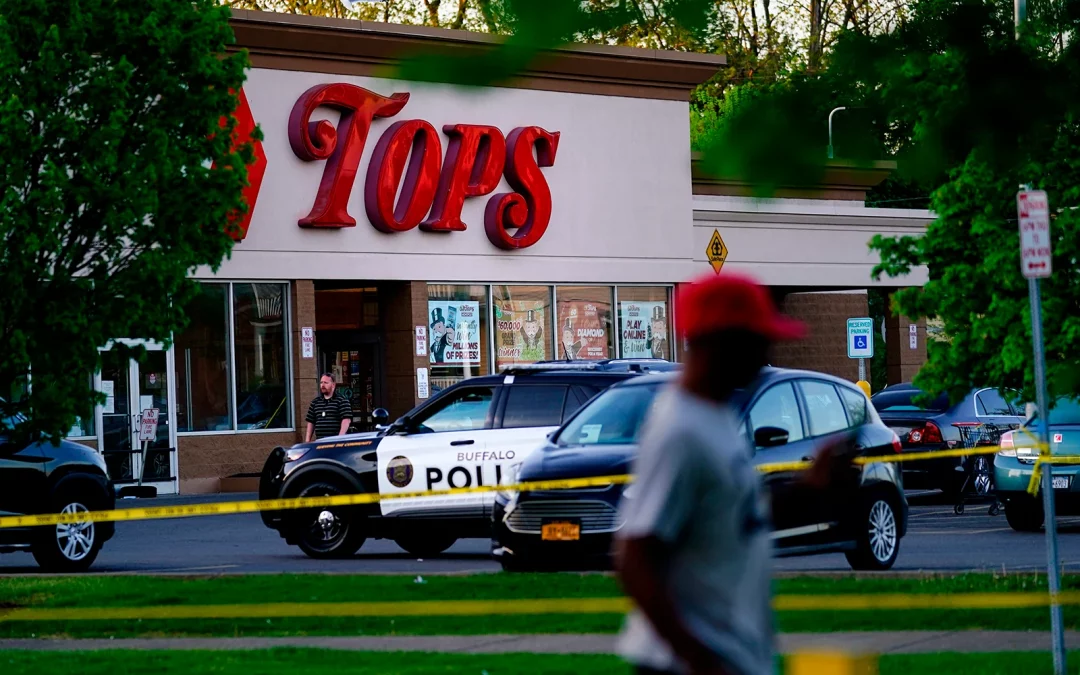
by Yonat Shimron, RNS | May 17, 2022 | Headline News, Social Justice |
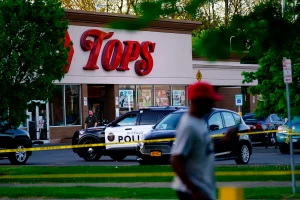
(RNS) — The man authorities say opened fire in a Buffalo grocery store Saturday (May 14), killing 10 mostly Black shoppers, was an avowed white supremacist. But his agenda went far beyond Blacks.
In the 180-page manifesto posted online two days before he carried out his attack, the 18-year-old gunman wrote that he chose the Tops Friendly Market on Buffalo’s east side because it is in an area with many Black residents. Eleven of the 13 people shot there were Black, law enforcement officials said.
Blacks, wrote Payton Gendron, come from a culture that sought to “ethnically replace my own people.”
But at the root of this xenophobic plan, known as replacement theory, are Jews to whom the alleged shooter devotes as much vitriol. Traditionally, Jews are depicted as stealth invaders who manipulate Western elites to disempower and replace white Americans.
Both Blacks and Jews are bound together in white supremacy, watchers of the movement say.
“You can’t separate the racism and antisemitism,” said Amy Spitalnick, executive director of Integrity First for America, the nonprofit that successfully sued organizers of the 2018 Unite the Right rally in Charlottesville, Virginia, where marchers chanted “The Jews will not replace us.”
“There needs to be some conspiracy responsible for everything terrible that these white supremacists think is happening to this country as a result of Black and brown people, immigrants and refugees,” said Spitalnick.
Dozens of pages in the Buffalo shooter’s manifesto are devoted first to Blacks and then to Jews, replete with photos, drawings, graphs and caricatures.
On Sunday and Monday, scores of American Jewish organizations loudly denounced the massacre, which the U.S. Justice Department is investigating as “a hate crime and an act of racially motivated violent extremism.”
The Anti-Defamation League, the National Urban League and others called on President Biden to convene a summit on hate and extremism and to develop a plan to combat hate crimes, white supremacy and violent extremism.
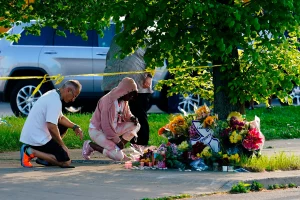
The “great replacement theory” that binds racism and antisemitism was once an obscure extremist idea relegated to white supremacist forums. But in recent years it has become mainstream, especially as Fox TV host Tucker Carlson has made the Democrats’ intent to dilute the white voting population a central theme of his show. Several congressional Republicans have echoed it or outright embraced the notion.
At its root, the theory holds that not only is immigration to the United States crowding out whites, but that a cadre of elites, including Jews, are intentionally encouraging that to happen.
That charge is not new, said Samuel Perry, professor of sociology and religious studies at the University of Oklahoma and a leading expert on white Christian nationalism. It’s core to many authoritarian movements, stretching back to Nazi Germany.
The idea, said Perry, is that white people aren’t fertile enough and that it is “everybody’s responsibility to outbreed the negative elements we don’t want in our society,” he said.
“It’s wrapped up in ethno-cultural outsiders: immigrants, Jews and Muslims. They are a threat to white hegemony,” Perry said.
The theory appeared to go dormant for some years but resurfaced in Norway in 2011 when Anders Behring Breivik killed 77 people. In 2019 in New Zealand, Brenton H. Tarrant killed 51 people in a pair of mosques while warning of “white genocide.”
About 20% of Gendron’s manifesto appears to be plagiarized from the declaration left by the New Zealand shooter, according to an analysis conducted by the Khalifa Ihler Institute, a Sweden-based think tank that seeks to combat extremism, The Washington Post reported.
In the U.S., white supremacy has a long history that has lately reemerged in mass-shooting sprees such as the 2015 massacre of nine people at a Black church in Charleston, South Carolina. Gendron praised Dylann Roof, the Charleston shooter, in his manifesto. Roof, like Breivik, he wrote, “fought for me and had the same goals I did.”
Three years later, Jews were the target when Robert Bowers gunned down 11 worshippers at Pittsburgh’s Tree of Life Synagogue, because he thought they were working to admit immigrant “invaders” into the United States.
For whatever reason, the Buffalo gunman sidestepped Jews this time, writing, “They can be dealt with in time.”
But he hardly spared them.
“The Jews are the biggest problem the Western world has ever had,” the manifesto reads. “They must be called out and killed, if they are lucky they will be exiled. We can not show any sympathy towards them again.”
White supremacists view American Jews as liberal, stereotypically tied up with institutions, such as government, media and academia, that are viewed as left-leaning and secular.
American Blacks, who are overwhelmingly Christian, are also on the wrong side of politics in the minds of xenophobes. Tending to vote Democratic, they are thought to support immigration — and to be a danger to white culture in themselves.
In the manifesto, Gendron writes about Blacks nearly the same way as about Jews. “We must remove blacks from our western civilizations,” his screed said.
Many Jewish groups issued statements of solidarity with Blacks Monday.
“Today, our multiracial Jewish community sits in grief, extending our love, solidarity, and support to the Black community in Buffalo and all who are in pain,” wrote Jamie Beran, interim CEO of Bend the Arc: Jewish Action. “Tomorrow, we rise in partnership to hold the politicians and corporations profiting from the spread of dangerous conspiracies accountable.”
Many are hoping the two groups can come together to fight the onslaught of hate.
“There needs to be clear recognition that you can’t take on antisemitism without taking on the various forms of hate bound up in white supremacy,” said Spitalnick. “All of our lives are intertwined.”
READ THIS STORY AT RELIGIONNEWS.COM


 García-Siller has met with the husband of one of the teachers killed in the shooting. The archbishop also spoke with a person who called 911 to report the shooting and referenced a woman who drove children to the hospital from the school. “We don’t need heroes. We need just people of goodwill,” he said.
García-Siller has met with the husband of one of the teachers killed in the shooting. The archbishop also spoke with a person who called 911 to report the shooting and referenced a woman who drove children to the hospital from the school. “We don’t need heroes. We need just people of goodwill,” he said.

 Our Gifts Should Honor God
Our Gifts Should Honor God





